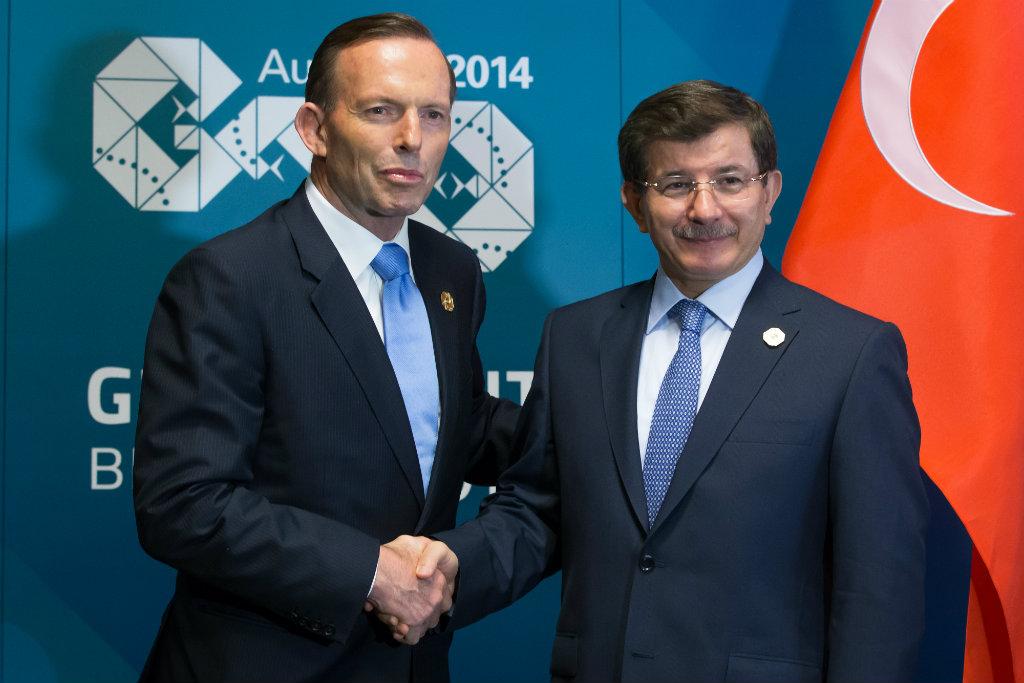Hosting the 2015 G-20 gives Turkey a chance to get its mojo back
(L-R) Prime Minister of Australia Tony Abbott shakes hands with Prime Minister of Turkey Ahmet Davutoglu during a bilateral meeting at the G20 Summit on Nov. 16, 2014 in Brisbane, Australia. Next year’s summit is set to be held in Istanbul.
WASHINGTON — 2014 was supposed to be a triumphant year, with the first ever election of a popularly elected president and renewed attention on Turkey’s strategic importance for a Middle East in turmoil.
Unfortunately, the rollercoaster of conflict throughout the region has only exacerbated myriad internal tensions that have further polarized Turkish society and its international friends.
Last year’s Gezi Park protests; allegations of corruption that led to crackdowns, including banning Twitter temporarily; more tensions with the Kurds; attacks on US sailors in Istanbul; and, most recently, President Erdogan’s public claim that Muslims first discovered America, have left the West scratching its head. Is this the “new” Turkey its leadership promised?
Turkey has been given the presidency of the G-20 for 2015. With many questioning the value of such summits and Turkey’s waning global standing, it is the perfect moment for Turkey to prove its critics wrong. This opportunity offers the country a chance to rebuild both its international standing as a Muslim-majority democracy, regional economic power and as a much-needed bridge to the developing world.
The G-20 is the latest in a series of initiatives aimed at international coordination of economic policy. It was formally established in 1999 in response to the Asian economic crisis, but was given new life after the global economic recession of 2008 with the aim to restore growth and strengthen resilience of financial institutions. Since it first replaced the G-8, the G-20 has shifted from an immediate crisis response model to the world’s leading forum for spurring growth and employment.
G-20 has expanded to include more of the world’s developing countries such as Brazil, India, Indonesia, and Turkey. These newly emerging geopolitical players stand along with institutions that represent the old boys’ clubs of colonial power.
Despite such efforts to become inclusive, many are still disappointed with the results. Africa and South America are barely represented, leading to frequent dismissals of the G-20 as just another way to exclude the poorest nations of the global south.
Turkey is gearing its foreign policy towards capitalizing on the G-20 Summit in a way only Istanbul can. On his way to the G-20 Summit in Brisbane, Australia, Turkish Deputy Prime Minister Ali Babacan told reporters that the focus of Turkey’s presidency will be on helping raise the representation of poor countries. In the past, he explained, Turkey had felt excluded from the decisions being made at summits like the G-8.
By focusing on development through its burgeoning relations with Africa, Central Asia, and the rest of the Muslim world while playing up its close historic ties with the West, Turkey can play a unique role unlike any other G-20 host before it.
Turkey has become one of the fastest-growing providers of aid after having only recently been a recipient itself. This development has raised Turkey’s credibility among the world’s developing nations to new heights. Championing growth in Somalia and among Palestinians and Muslims in Myanmar has given Turkey a natural voice for the regions least represented and understood by the West.
The rise of modern Turkey has coincided with an international environment transformed from bipolar Cold War geopolitics into a more diffuse world. In the last decade, Turkey has tripled its GDP and positioned itself as an invaluable economic conduit between the Middle East and Europe. It has become an energy hub critical in providing a Russia-free solution to supply energy to Europe.
These robust efforts represent the self-confidence of a Muslim-majority nation that can offer its own alternatives to global problems. But in an environment in which Turkish foreign policy and its leadership are being constantly tested, many have lost sight of the vitality its young population brings to the world. There has never been a more opportune time for Turkey.
Dr. Joshua W. Walker is a longtime analyst of Turkey who studied in Ankara on a Fulbright Fellowship and previously worked for the US State Department. He is currently a Truman National Security Fellow.
We want to hear your feedback so we can keep improving our website, theworld.org. Please fill out this quick survey and let us know your thoughts (your answers will be anonymous). Thanks for your time!
